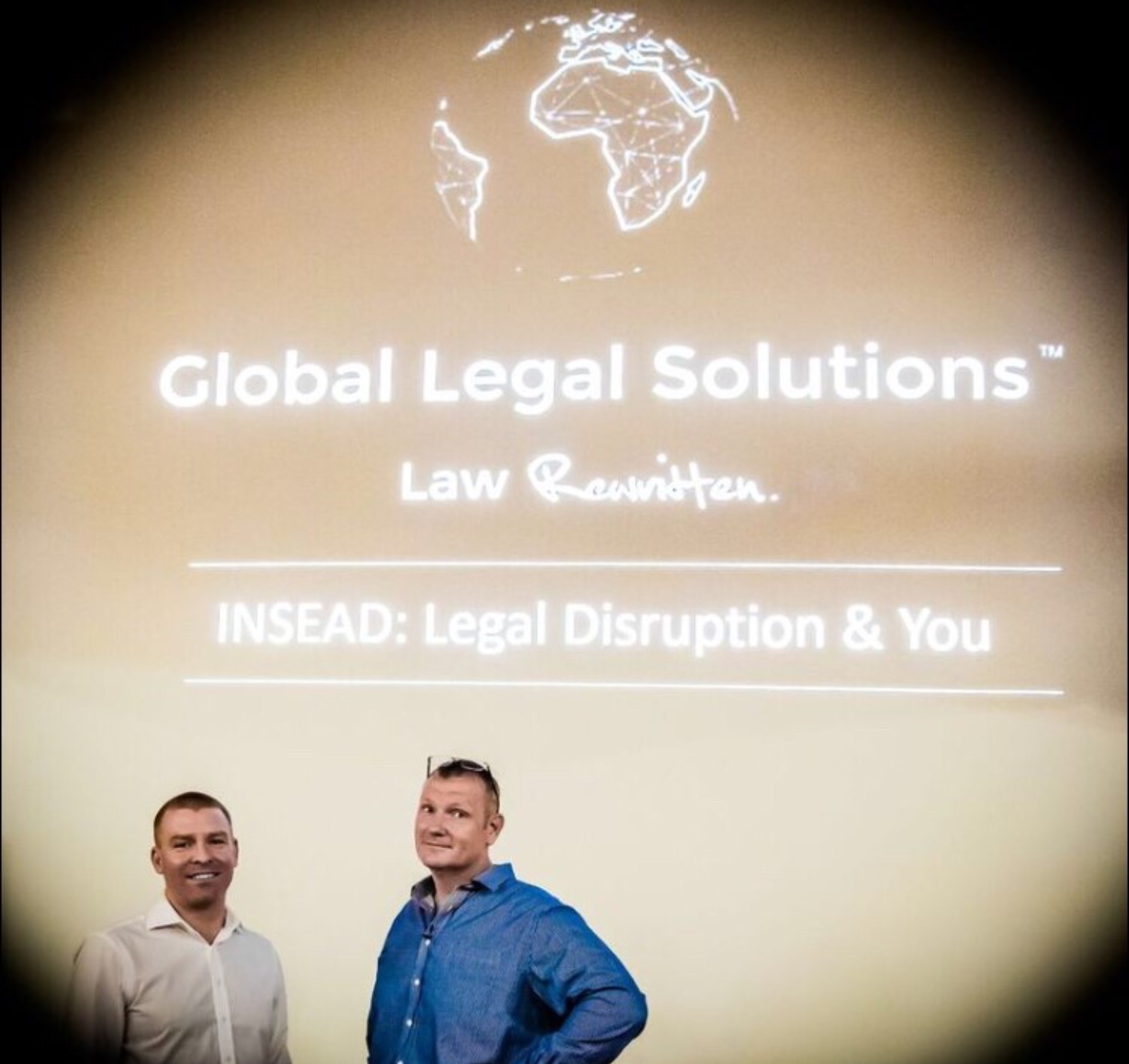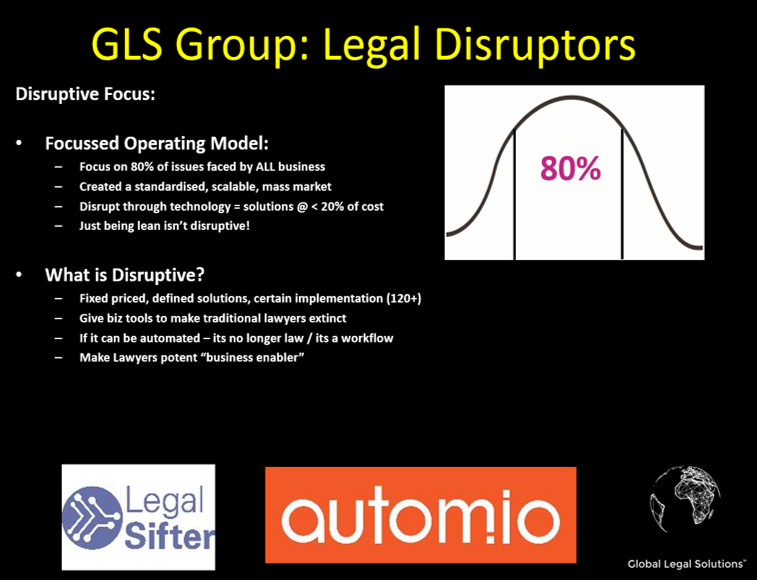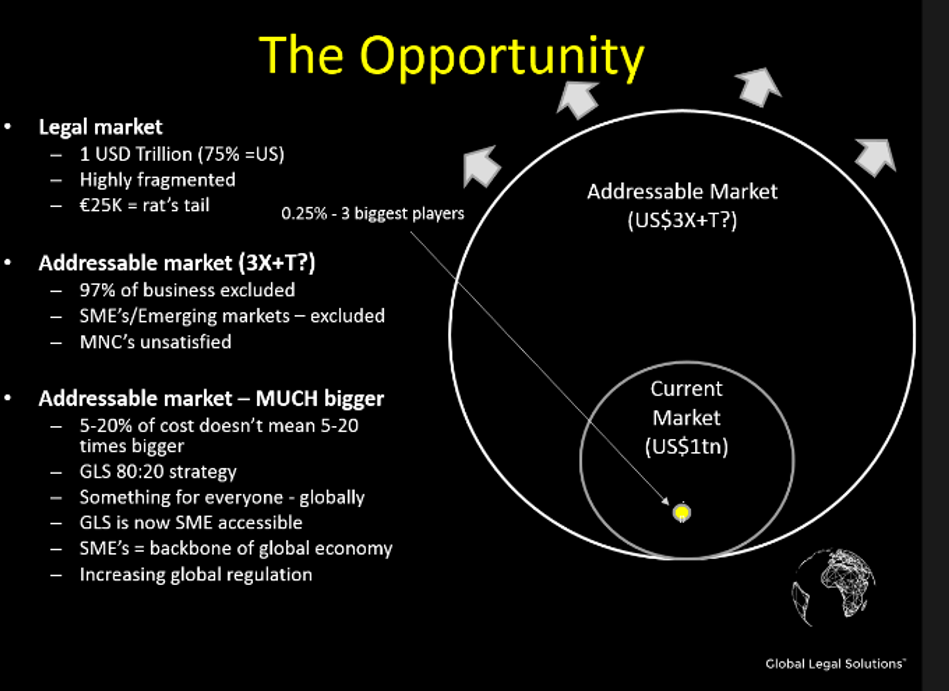Back
GLS Goes Back to School
4 minutes • 13 Dec 18

GLS’s mission, since its inception, has been to disrupt the second half of that statement and over the past 5 years GLS has now brought the cost of world class legal services down by more than 80% through its “New Law” offering.
On Tuesday of this week GLS Founder, Matt Glynn, attended INSEAD’s MBA programme (Singapore Campus) as a guest lecturer and shared some of the insights gained by GLS as it works on disrupting the legal industry.The lecture asked what aspects of the legal industry could be disrupted and how could budding entrepreneurs access business enabling New Law support to get more business done?
Is the billable hour misaligning the interests of law firms and clients?
What would the size of the addressable legal market be, if most businesses could actually access it??
What would constitute “disruptive technology” in the legal industry?
If lawyers are paid so much, why does the legal industry suffer such a high attrition rate?
Many of the INSEAD students had worked with or used traditional law firms and had some familiarity with traditional private practice law firms (and the frustrations of using them).
These students were therefore incredibly eager to hear that affordable solutions exist and that they are incredibly easy to access!
Matt started by explaining how GLS was created and why it was structured, from the outset, to be fundamentally disruptive to the legal industry.

By way of an example of this disruptive approach in practice, Matt introduce GLS’s newest, and potentially most disruptive new offering – “GLS Total Legal Support” (“TLS”).
TLS is a subscription based support package for start-ups/SMEs, that combines a world class library of automated contracting precedents AND legal advice.
The entry level “Bronze” TLS package can deliver in excess of USD65K worth of support over a year at a cost as low as USD99 per month!
"In effect, GLS TLS makes the kind of in-house legal team that traditionally could only be afforded by large MNCs, accessible to even the smallest of start-ups - all for less than what many spend on Starbucks each month."
Matt went on to explain, that only by breaking away from the traditional model and offering an alternative structure for legal services, such as TLS, could the interests of GLS and clients really become aligned.
GLS’s disruptive approach allows it to help far more businesses get far more business done whilst creating a far larger addressable market, which ironically, Traditional Law has never looked to serve.

The presentation finished off by “lifting the curtain” on how businesses can be engaging with both “Traditional Law” and “New Law” players in a way that lets them get a lot more done with a lot less resources.
In particular, Matt explained 5 key tips that all clients should be employing if they want clear and more practical advice (whilst reducing their legal spend by >50%):
1) Ask “Is your question so special”?
For 80% of any business’s needs, the issue has arisen and been answered comprehensively before. Seek out a New Law response to your question.
For such issues, there is no point in paying traditional law firm rates for a law firm to “reinvent the wheel”.
2) Decide what you want to pay for
The traditional law firm fee model is based on every dollar being split 33% for the lawyer, 33% for Opex and 33% for the profit pot.
So, decide what you want to pay for – consider looking for the lean firm and look for the boutique advisor if you don’t want to pay over the odds.
3) Understand what you are getting?
Law firm advice is prepared in a Professional Indemnity context which necessarily entails significant qualifications and caveats – caution is clearly required.
By way of a simple comparison: a formal legal opinion is PI backed, but the “yes or no” advice given by an in-house lawyer is what actually get’s the business “done”.
4) Recognise the nature of the law
Laws are often prohibitive, not permissive. So, there is often a disconnect when client’s construct their questions in the permissive form.
Businesses could do well to pose their questions on the basis of “is there any clear guidance which prevents what we intend to do?” Such answers are frequently more categoric and more efficiently sourced.
5) Make the lawyer get back to lawyering
Lawyers love to fix things – so let them.
Take your complexity there - but not your project management.
Ask early - late is expensive - but only ask after you have followed the first 4 tips!
THANKS:
Thank you again INSEAD for the invitation to teach and learn from such an engaging group of Students!
Thank you Alexia Adda (a lawyer at the offshore firm Walkers, and current student of INSEAD) that made this event happen.
ABOUT GLS:
The GLS Group is the world’s leading legal industry disruptor. Founded in 2014 by a core team of highly recognised market leaders from top-tier global law firms (together with some of their clients). The GLS Group, now has over 200 staff globally and was shortlisted in 2018 by the Financial Times for its “Most Innovative Law Firm Asia Pacific – New Business and Service Delivery Model” award.
For more information please contact: info@gls.global or the GLS Group on (+65 6817 8204)
